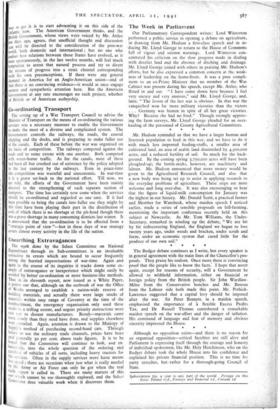Mr. Hudson reminded us that we have a larger human
and livestock population to feed in this war, and we have to do it with much less imported feeding-stuffs, a smaller area of cultivated land, an area of arable land diminished by 4,500,000 acres, and a reduced fertility of soil. So much for the back- ground. By the coming spring 3,750,000 acres will have been ploughed-up; the bottle-necks, however, are machinery and labour. Mr. Hudson announced that more money would be given to the Agricultural Research Council, and also that a new body was being set up to assist in applying research to the everyday problems of agriculture. These steps are most welcome and long over-due. It was also encouraging to hear that the figure of liquid-milk consumption for January was the highest in our history. Mr. Donald Scott, a practical farmer and Member for Wansbeck, whose maiden speech I noticed earlier, made a series of sensible proposals on hill-farming, mentioning the important conference recently held on this subject at Newcastle. As Mr. Tom Williams, the Under- Secretary, remarked in winding up the debate, "We are bit by bit rediscovering England, the England we began to lose twenty years ago, under weeds and bracken, under scrub and furze, under an economic system that cared little for the produce of our own soil."






























 Previous page
Previous page